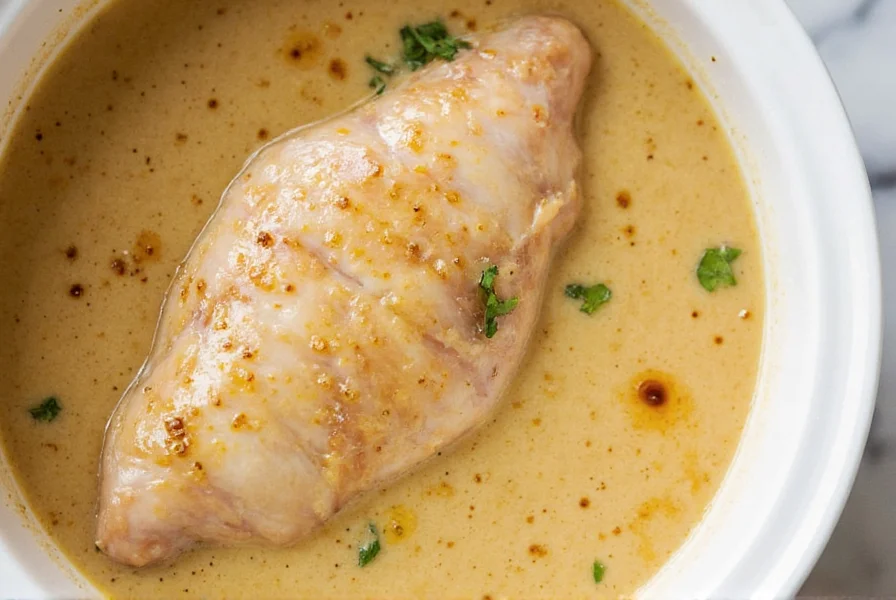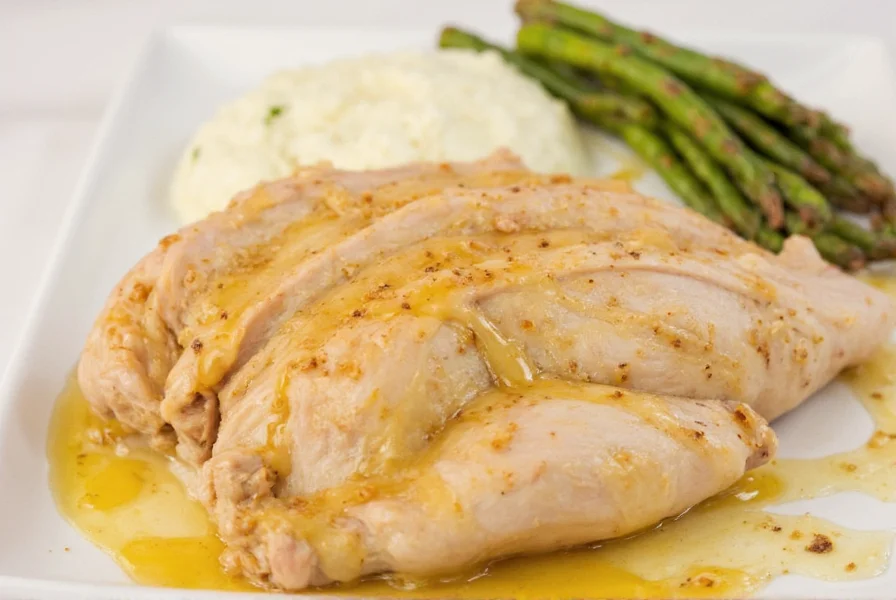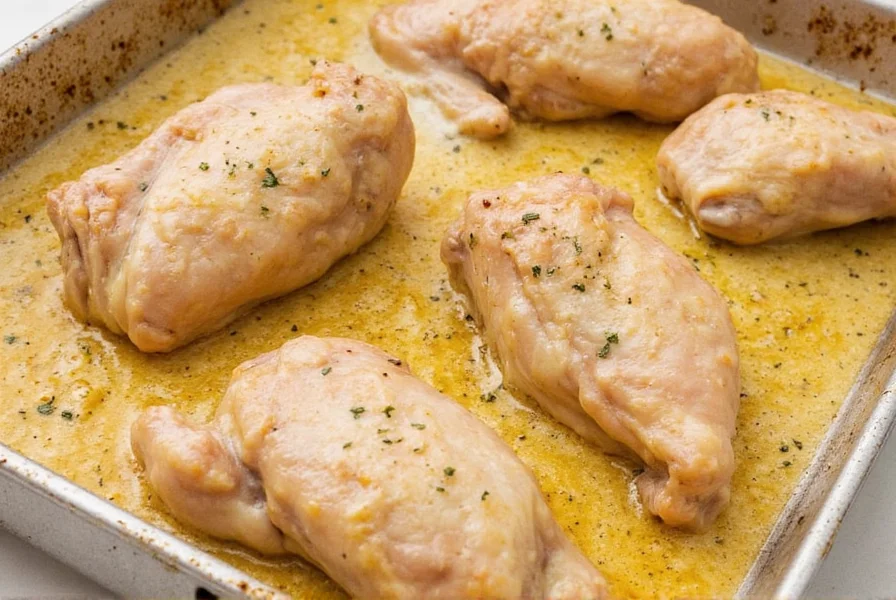Marinating chicken in buttermilk tenderizes the meat through enzymatic action and mild acidity, resulting in juicier, more flavorful chicken. For optimal results, combine 2 cups buttermilk with 1-2 tablespoons of salt and your preferred seasonings, then submerge chicken pieces for 4-12 hours in the refrigerator. This simple buttermilk chicken marinade works particularly well for fried chicken, baked preparations, and grilling.
Buttermilk isn't just for pancakes—it's a chef's secret weapon for transforming ordinary chicken into exceptionally tender, flavorful dishes. The magic happens through a perfect balance of lactic acid and enzymes that gently break down proteins without the harshness of vinegar or citrus-based marinades. This enzymatic tenderizing process penetrates deeper than surface-level marinades, working its way into the meat fibers for consistent results from edge to center.
The Science Behind Buttermilk Marinades
Understanding why buttermilk works so well for chicken requires examining its unique composition. Traditional buttermilk contains live cultures that produce lactic acid, which has a pH of approximately 4.4—mild enough to tenderize without 'cooking' the meat like stronger acids would. The enzymes in buttermilk, particularly proteases, break down tough muscle fibers while the milk proteins help retain moisture during cooking.
Unlike vinegar or lemon juice marinades that can create a mealy texture when overused, buttermilk's gentle action provides consistent tenderizing without compromising the chicken's structure. This makes it ideal for how long to marinate chicken in buttermilk scenarios where extended marinating times are beneficial.
Perfect Buttermilk Marinade Recipe
Creating the ideal buttermilk chicken marinade requires precise ratios and quality ingredients. Here's a professional chef-tested formula that delivers consistent results:
| Ingredient | Amount for 2 lbs Chicken | Function |
|---|---|---|
| Full-fat buttermilk | 2 cups | Tenderizing base |
| Kosher salt | 1-2 tbsp | Moisture retention & flavor enhancement |
| Garlic powder | 1 tsp | Flavor foundation |
| Onion powder | 1 tsp | Flavor foundation |
| Paprika | 1 tsp | Color & subtle sweetness |
| Black pepper | 1/2 tsp | Complexity |
For southern style buttermilk chicken marinade variations, many chefs add 1 tablespoon of hot sauce or cayenne pepper for heat, while others incorporate 1 teaspoon of dried thyme or rosemary for herbal notes. The key is maintaining the buttermilk-to-seasoning ratio to prevent overpowering the tenderizing action.

Optimal Marinating Times by Cut
Understanding buttermilk chicken marinade timing is crucial for perfect results. Different chicken cuts require varying marinating durations due to their fat content and muscle density:
- Boneless, skinless breasts: 4-8 hours (longer than 8 hours may create overly soft texture)
- Bone-in breasts or thighs: 8-12 hours (bones slow penetration, requiring longer time)
- Whole chicken pieces: 12-24 hours (for maximum flavor penetration)
- Chicken wings: 4-6 hours (smaller size requires less time)
Never marinate chicken in buttermilk for more than 48 hours, as the prolonged enzymatic action can break down the meat structure too much, resulting in a mushy texture. The refrigerator temperature (below 40°F/4°C) is essential for food safety during extended marinating periods.
Step-by-Step Marinating Process
Follow these professional techniques for flawless buttermilk-marinated chicken:
- Place chicken in a large resealable plastic bag or non-reactive container (glass or stainless steel)
- Pour buttermilk mixture over chicken, ensuring all pieces are fully submerged
- If using a bag, press out excess air before sealing to maximize contact
- Refrigerate on the bottom shelf of your refrigerator to prevent cross-contamination
- Rotate the container or flip the bag halfway through marinating time
- Do not rinse chicken after marinating—this removes the protective coating that helps breading adhere
- Pat dry with paper towels only if preparing for frying to ensure crisp coating
Cooking Tips for Marinated Chicken
Buttermilk-marinated chicken requires specific cooking approaches to maximize results:
- For buttermilk marinade for fried chicken, let the marinated chicken sit at room temperature for 20-30 minutes before frying to ensure even cooking
- When baking, place marinated chicken on a wire rack over a baking sheet to allow air circulation
- For grilling, oil the grates thoroughly and maintain medium heat to prevent sticking
- Always cook to an internal temperature of 165°F (74°C) measured in the thickest part
- Allow 5-10 minutes of resting time after cooking for optimal juiciness

Common Mistakes to Avoid
Even experienced cooks make these errors with buttermilk chicken marinades:
- Using low-fat buttermilk: Full-fat buttermilk provides better flavor and tenderizing properties
- Skipping the salt: Salt is crucial for both flavor and moisture retention during cooking
- Marinating at room temperature: Always marinate in the refrigerator for food safety
- Rinsing after marinating: Removes the protective layer that helps coatings adhere
- Over-marinating: Can lead to mushy texture, especially with delicate cuts like breasts
- Not adjusting for buttermilk substitutes: When using buttermilk marinade without buttermilk substitute alternatives, acid levels differ significantly
Buttermilk Substitutes and Alternatives
When you don't have buttermilk on hand, these alternatives work with adjustments:
- Milk + acid: 1 cup milk plus 1 tablespoon lemon juice or vinegar (let sit 5 minutes)
- Yogurt thinned with milk: 1 cup plain yogurt mixed with 1/4 cup milk
- Sour cream thinned with milk: 1/2 cup sour cream with 1/2 cup milk
When using substitutes, reduce marinating time by 25-50% since these alternatives often have stronger acidity than traditional buttermilk. The best buttermilk chicken marinade recipe always starts with authentic cultured buttermilk when possible, as the live cultures provide superior tenderizing action.
Why Buttermilk Outperforms Other Marinades
Buttermilk's unique properties make it superior to other marinade bases for chicken. While vinegar and citrus juices work through acid alone, buttermilk combines mild acidity with enzymatic action from live cultures. This dual-action approach tenderizes more evenly without creating the rubbery texture that can occur with highly acidic marinades.
The milk proteins in buttermilk also form a protective layer around the chicken that helps retain moisture during cooking. This explains why does buttermilk tenderize chicken more effectively than other dairy products—its specific pH balance and enzyme profile create the ideal conditions for protein breakdown without denaturing the meat structure.
How long can chicken safely marinate in buttermilk?
Chicken can safely marinate in buttermilk for 4-24 hours in the refrigerator. Boneless breasts should marinate 4-8 hours, while bone-in pieces can go 8-12 hours. Whole chickens benefit from 12-24 hours. Never exceed 48 hours as the texture becomes mushy. Always marinate in the refrigerator at or below 40°F (4°C).
Can I reuse buttermilk marinade that had raw chicken in it?
No, you should never reuse buttermilk marinade that has contacted raw chicken due to food safety risks. The marinade becomes contaminated with raw chicken juices and bacteria. If you want to use some as a sauce, reserve a portion before adding the chicken, or boil used marinade vigorously for at least 2 minutes to kill pathogens before using as a sauce.
Why is my buttermilk-marinated chicken still tough?
Several factors could cause tough chicken: insufficient marinating time (especially for bone-in pieces), using low-fat buttermilk which has less tenderizing power, not including enough salt in the marinade, or overcooking after marinating. For best results, use full-fat buttermilk, marinate bone-in pieces 8-12 hours, include 1-2 tablespoons of salt per 2 cups buttermilk, and cook to exactly 165°F (74°C) internal temperature.
Does buttermilk marinade work for frozen chicken?
No, buttermilk marinade won't properly penetrate frozen chicken. Always fully thaw chicken in the refrigerator before marinating. Attempting to marinate frozen chicken results in uneven flavor distribution and potentially unsafe food temperatures during the thawing process. Plan ahead and allow 24 hours for a whole chicken to thaw in the refrigerator before beginning the marinating process.
Can I make buttermilk marinade ahead of time?
Yes, you can prepare buttermilk marinade up to 24 hours in advance and store it covered in the refrigerator. However, do not add the chicken until you're ready to begin the marinating process. Pre-mixed marinade without chicken maintains its potency better than when already in contact with meat. Always discard any unused marinade that hasn't touched raw chicken after 48 hours in the refrigerator.











 浙公网安备
33010002000092号
浙公网安备
33010002000092号 浙B2-20120091-4
浙B2-20120091-4